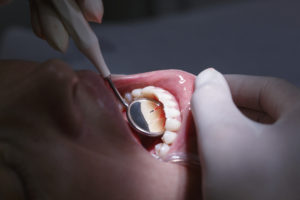5 Common Signs of a Bad Tooth

Good oral hygiene comprises many things, including properly brushing your teeth twice a day, flossing every day, maintaining a good diet, and visiting your dentist every six months, among other things. Usually, a dental checkup should help to identify any looming problems with your teeth and gums, but something could arise before the next dental visit, as noted by Chula Vista Dentist, Dr. Deanna Risos.
5 Common Signs of a Bad Tooth
1. Discoloration
Avoiding foods and drinks that stain your teeth, rinsing your mouth with clean water after meals, and chewing sugar-free gum are some ways to keep your teeth clean and healthy, in addition to brushing twice a day.
Inspect your teeth every time you brush for any changes. Even if your teeth are not stark white, you should still be able to detect any changes in their color, in the form of small dots or stains. These could be early indicators of a cavity and should be checked out as soon as possible.
2. Tooth pain
If you notice some pain in your tooth, chew gently as you exert some force on that tooth to see if you feel some pain or a twinge from that area. Check for inflammation in the gums around the tooth.
It is possible that the pain is due to rotting of the tooth roots in that area, or tartar buildup below the gum-line.
It is important that you visit your dentist immediately for proper diagnosis of gum disease and/or tooth root, and the appropriate intervention started to avoid tooth loss.
3. Cracked or broken tooth
Damage to the tooth could be caused by trauma, including clenching and grinding your teeth (bruxism). In mild cases, the damage can be controlled by wearing night guards, though you may also need a filling if the damage results in tooth sensitivity. Damaged dental fillings should also be inspected in case repair is necessary.
4. Tooth sensitivity
Erosion of tooth enamel occurs when acids in the mouth gradually wear away the surface of the tooth, exposing the inner dentine that contains nerves and blood vessels.
Acidity in your mouth can be caused by eating foods rich in acid, like citrus fruits; drinking acidic drinks like soda; gastroesophageal reflux disease (GERD), a condition that causes acid from the stomach to come up the esophagus and reach the mouth – causes heartburn but not necessarily vomiting.
Depending on the severity of tooth enamel wear, your dentist can recommend a filling or root canal treatment.
5. Loose teeth
Shaky permanent teeth should never be ignored as they could be an indication of an advanced case of gum disease known as periodontitis that could lead to tooth loss. Loose teeth could result when bacteria build up below the gumline, causing soft and hard tissues around the affected tooth to break down.
The more these tissues are destroyed, the more likely your chances of tooth loss. Loose teeth could also indicate an infection or scleroderma.
Proper oral hygiene should help prevent these cases of bad teeth. But if you feel that your tooth may be damaged for any reason, visit your doctor immediately for proper diagnosis and treatment to save your tooth.
